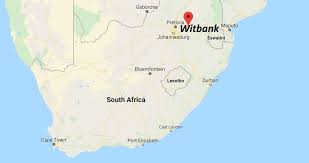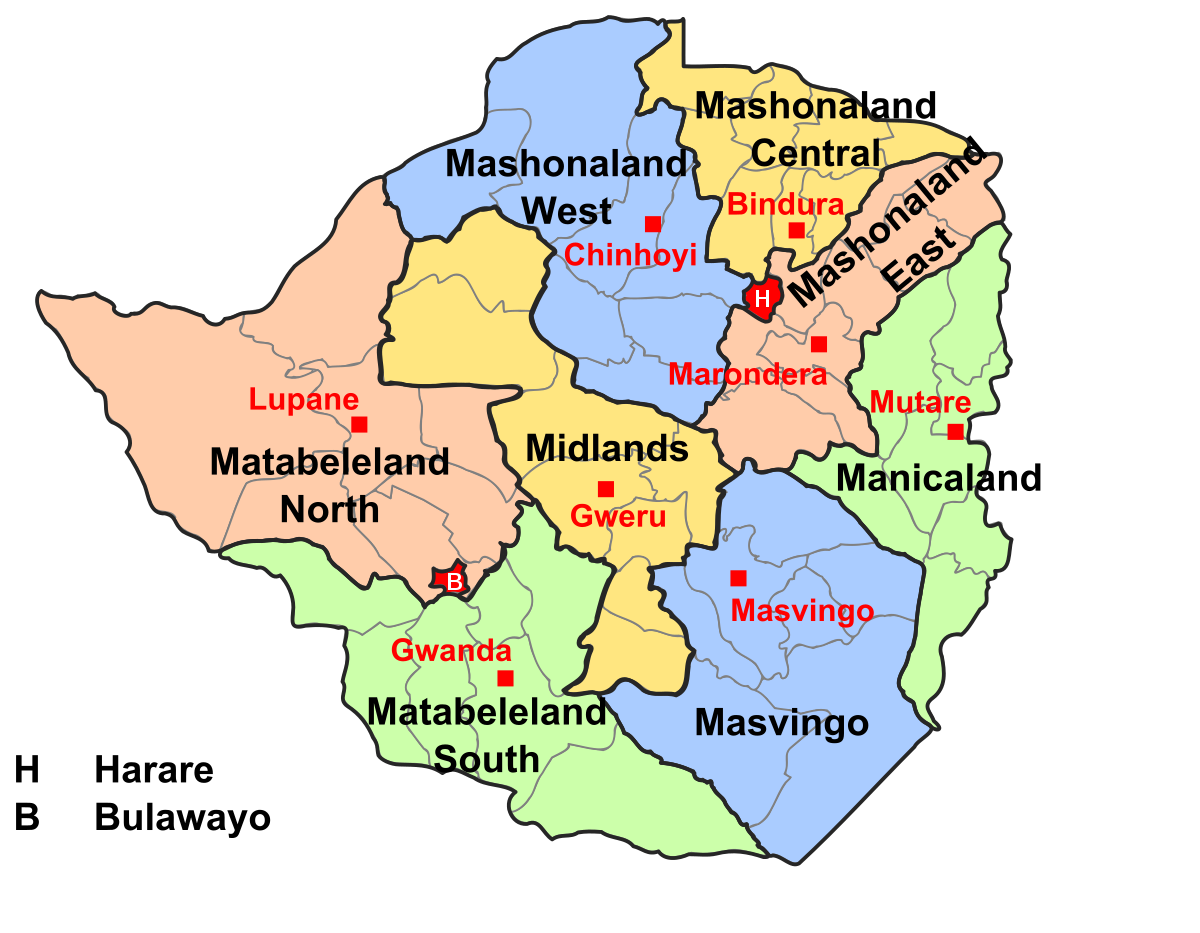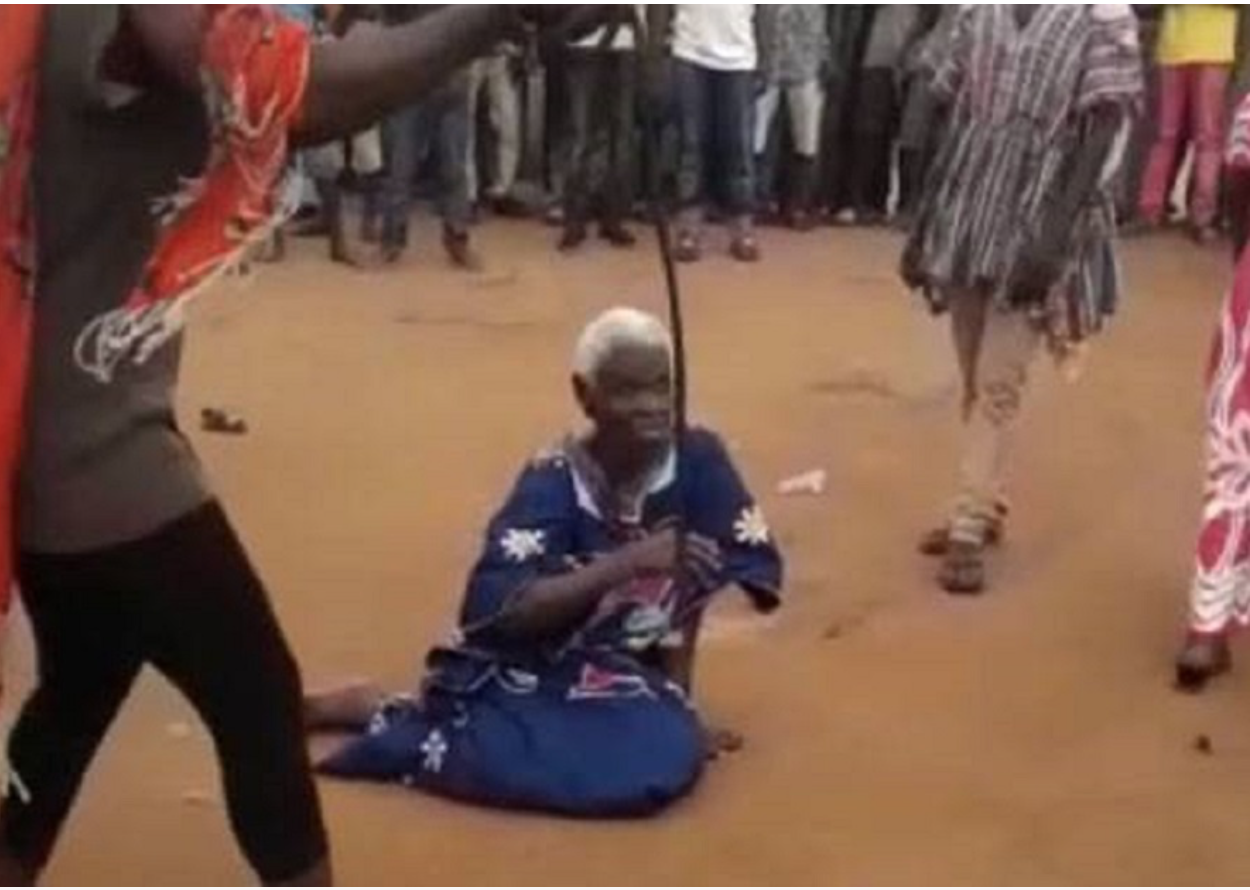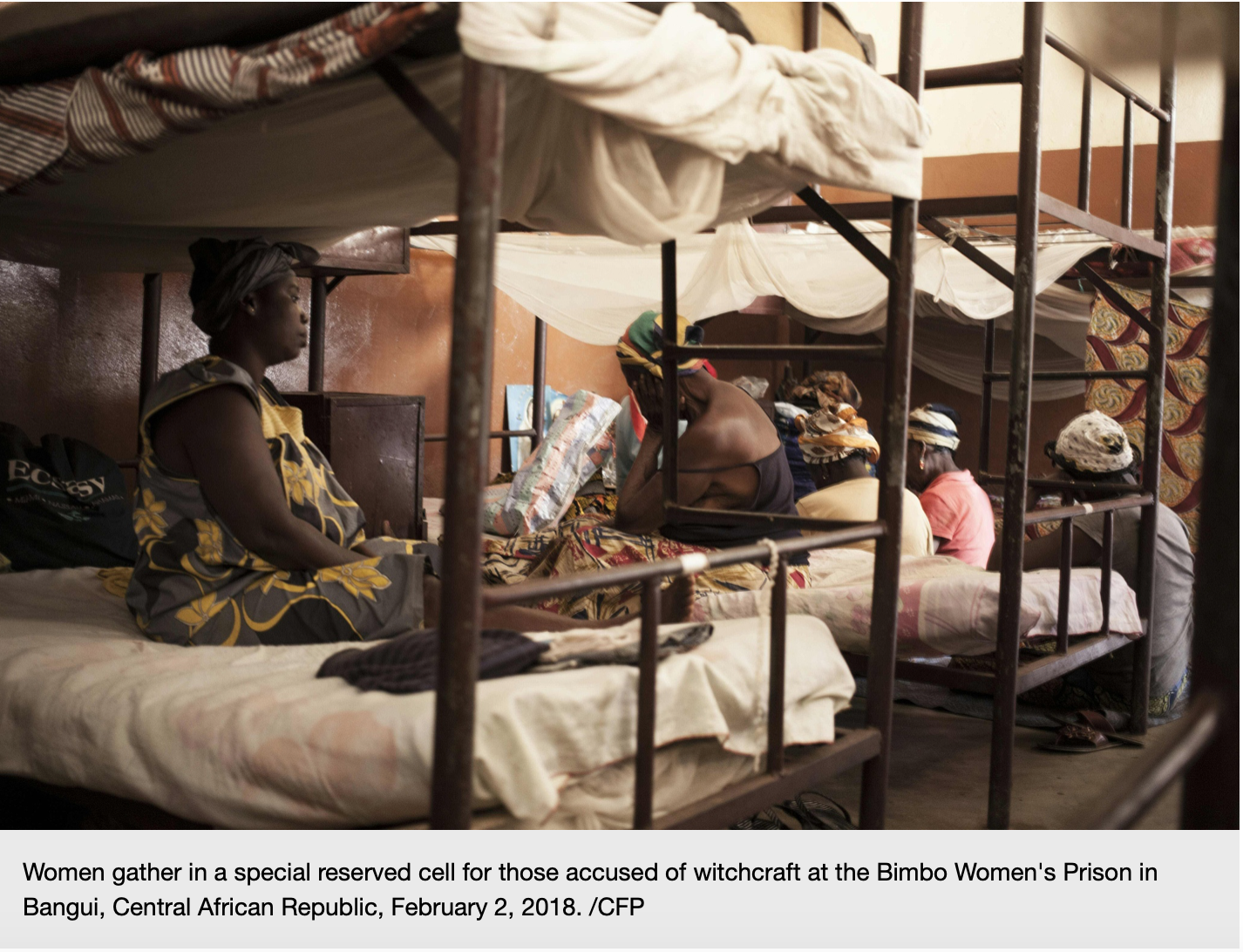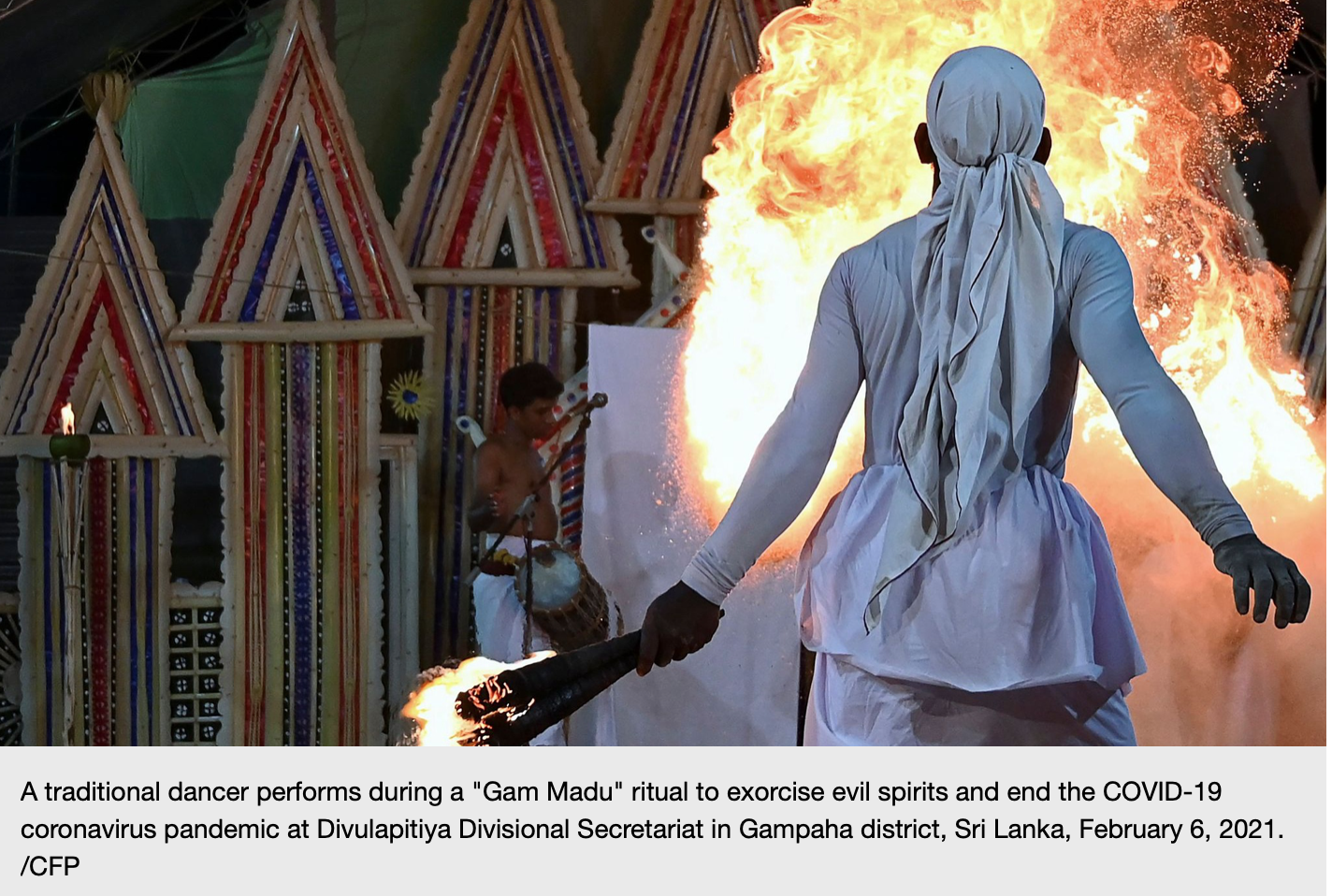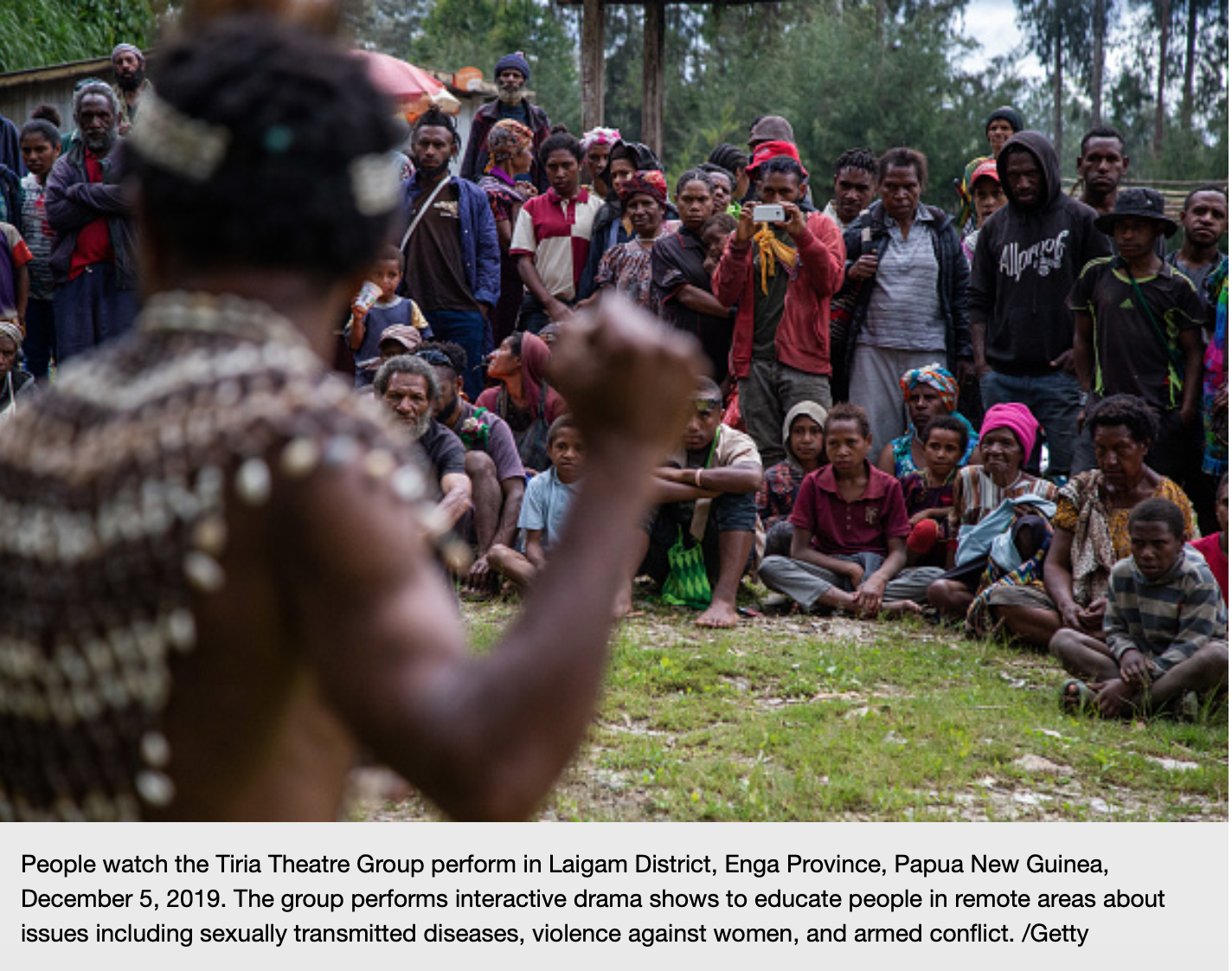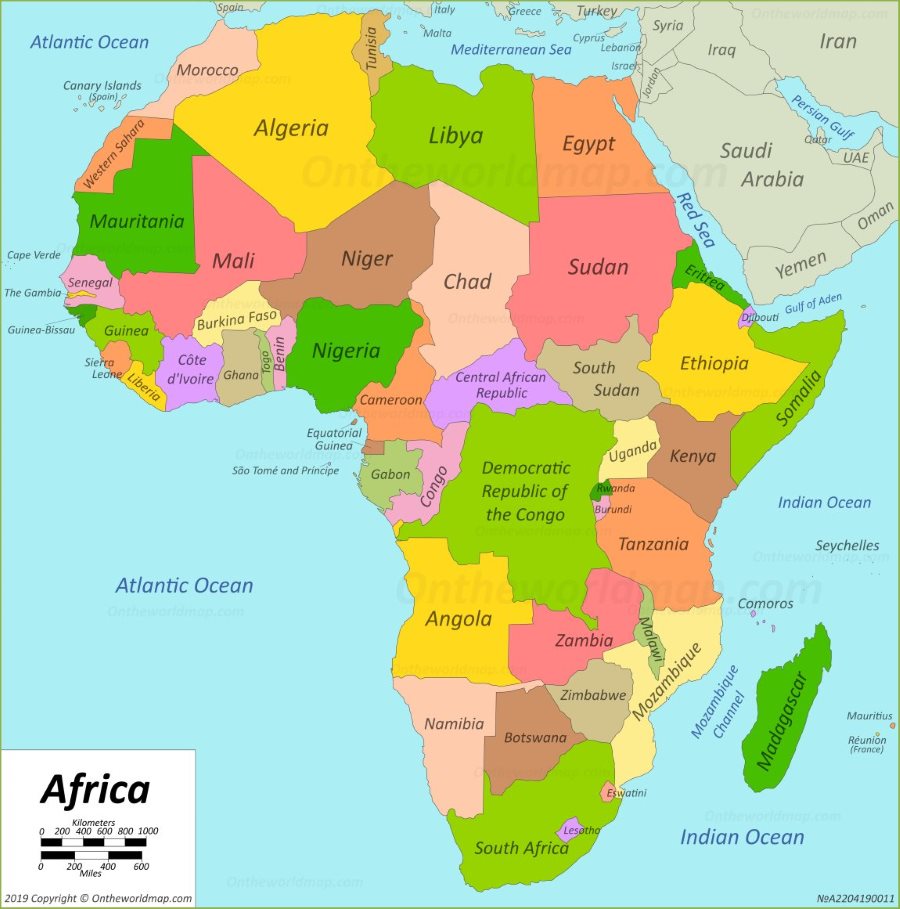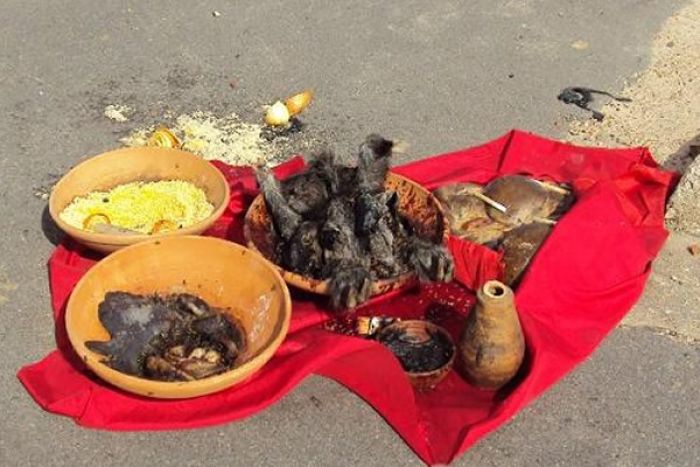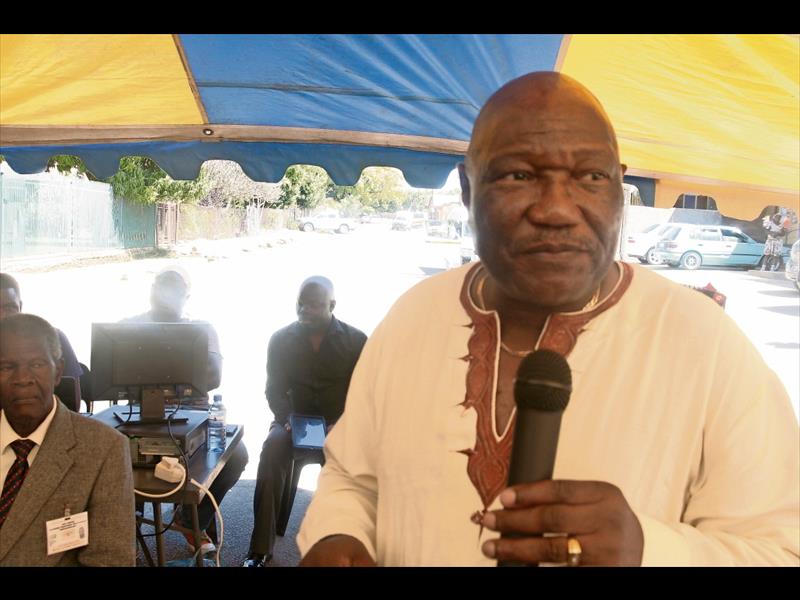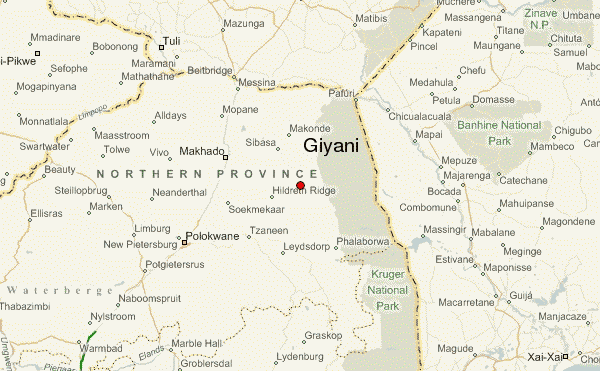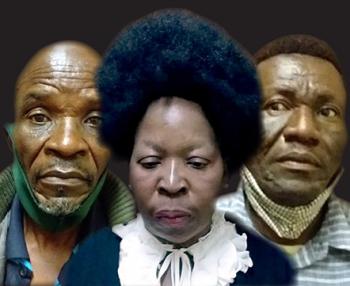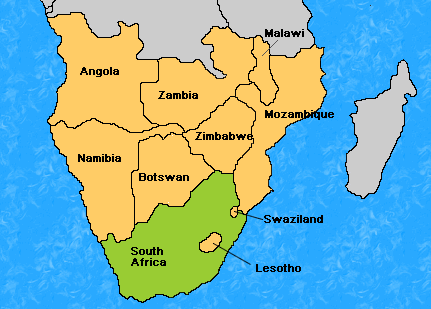The reader is being warned that the following articles contain graphic details of the kidnapping and murder of a young girl with albinism, Gabisile Shabane, who was killed for her body parts. The gruesome crime took place in Emalahleni (formerly Witbank) in South Africa in January 2018. The kidnapping of the young innocent girl of only 13 years old and her gruesome fate not only shocked the residents of Witbank, as illustrated by the tweet below, but shocked the entire nation and was widely covered in the press, as illustrated by the news articles below describing the related events in the past three years (2018-2021).
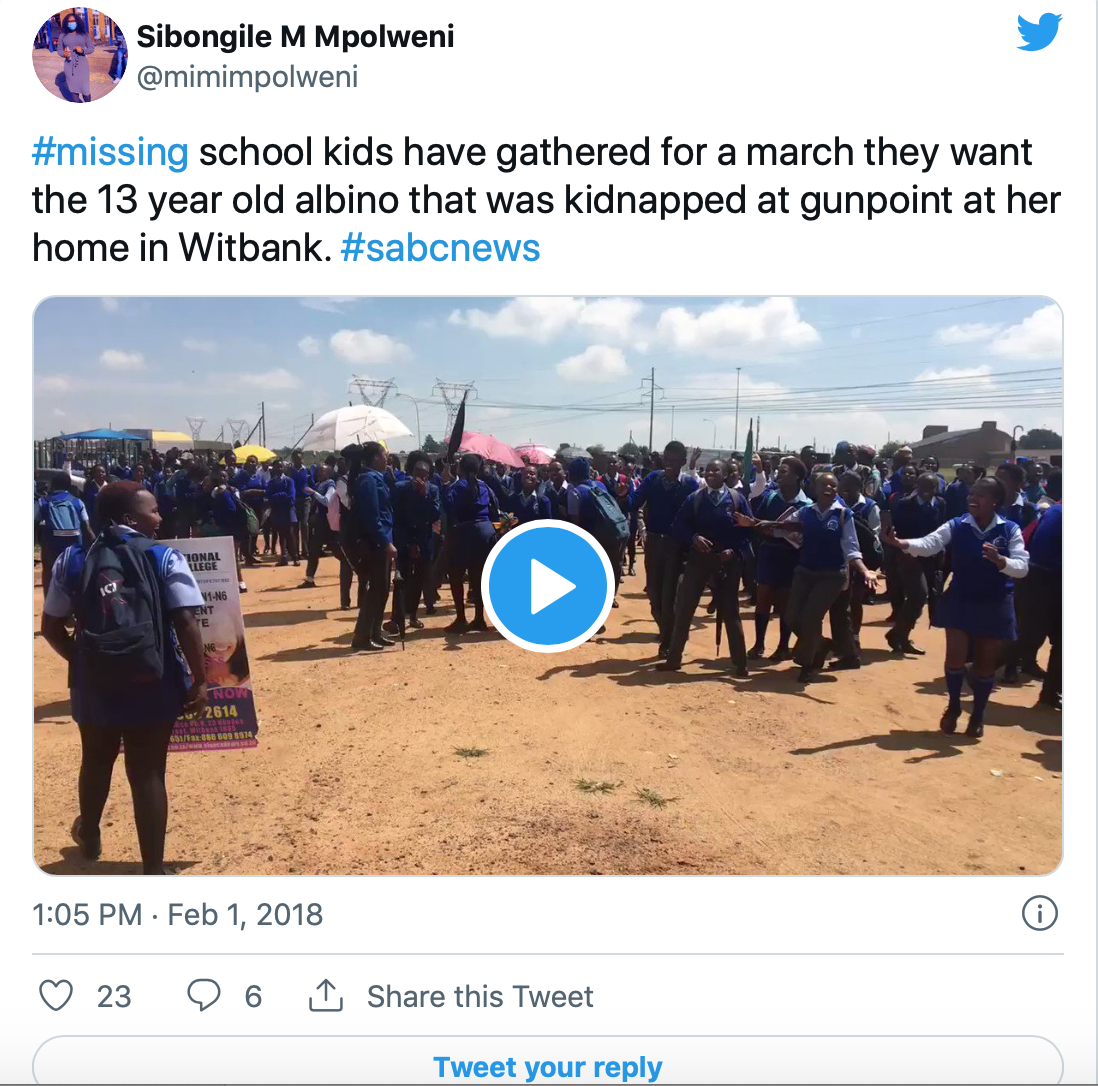
I reported earlier on the murder of Gabisile Shabane, who was abducted together with her 15-months old cousin: on April 30, 2018 (South Africa: ‘Fake sangoma murderers’ target albino body parts for rituals) and August 23, 2019 (South African teacher admits to killing teen with albinism for ritual purposes). Again, I wish to commend the South African authorities for their swift action to apprehend and prosecute the suspects and also I wish to congratulate the press in South Africa for its extensive coverage of this important trial. Only by raising the awareness of the general public that these crimes have no place in the 21st century and a stiff warning to traditional healers, sangomas and others that their criminal acts will no longer remain unpunished can we end these barbaric crimes against humanity and the violation of peoples’ most sacred human rights: the right to live. (webmaster FVDK).

South Africa: Blood of murdered girl with albinism used for ‘cleansing’, says state witness
Published: October 11, 2021
By: Naledi Shange – TimesLIVE, South Africa
A state witness has given shocking testimony in the trial of three men implicated in the murder of Gabisile Shabane, a young girl with albinism from Emalahleni (formerly Witbank) who was abducted and murdered in January 2018, allegedly for her body parts.
The three accused are Thokozani Msibi — a traditional healer originally from Eswatini who lived and practised in Emalahleni and the alleged mastermind behind the plot — Knowledge Wezi Mhlanga and Mthobisi Brilliant Mkhize.
A fourth accused, Mfanasibili Gamedze, died behind bars while waiting to be extradited to SA from Eswatini, while a fifth accused, Josiah Thubane, pleaded guilty to his part in the murder in 2019. He is already serving his sentence.
The state witness, who is not being named and is under witness protection, was present when Shabane was murdered, dismembered and buried in a shallow grave in Cullinan, near Pretoria.
TimesLIVE is referring to him as Mr X.
Delivering his testimony to the high court sitting in Middelburg, Mr X said he was there when Shabane was forced to drink a beer laced with brake fluid and also some dagga before her killing. Mr X said he had taken part in rituals which were performed using Shabane’s body parts and blood.
Mr X had begun delivering his testimony last week. Continuing on Monday, he told the court his version of the events that unfolded at a farm in Cullinan when Shabane was killed and buried.
“Mr Msibi closed the hole [shallow grave where Shabane was buried] while Mr Gamedze was busy with the plastic which contained the parts. It was then that Msibi said now is the time for us to do a cleansing ritual on ourselves,” Mr X told the court.
“I was told that it was time for me to cleanse, so my mom could get well and all our things could go OK. We then all took off our clothes. We cleansed with the contents of the bucket.”
The bucket had contained a mixture of muthi, water and Shabane’s blood. Msibi took some muthi and sprinkled it onto the grave, speaking some words as he did this.
Mr X told the court that after dressing, as they were walking back to a house on the farm, Msibi stopped them and said, “Men, can everything that has happened here stay between us — no matter what the situation is, it should be kept between us.”
“He was referring to the killing of Gabisile and the removal of her body parts. He pleaded with me and also made reference to Mkhize [who allegedly had driven them from Witbank after Gabisile’s abduction], saying that even though we did not partake [in the killing], we should keep this secret to ourselves,” said Mr X.
“I promised him that I would never disclose anything. He said if we ever spoke about this, we would get to see the full might of his muthi.”
On the way back to the house, they covered their tracks and used soil to cover some blood spatter from Shabane that had been shed along the way.
Mr X said he had dug three holes and covered them again, which he hoped would act as a decoy to ensure that Shabane’s body would never be found.
The men went back to the house, where Mr X cooked a meal for them to eat. Mr X said it was during this time that he had told Msibi that he needed to go back to Witbank because he was working from 2pm. He was employed at a petrol station.
“He said I should stop complaining and that there was no need for me to go back to my work because from then on, I was rich,” Mr X told the court.
Mkhize, who had earlier left the men at the farm, returned with plates of takeaway food, gave it to Mr X, Mkhize and Gamedze. They then packed their belongings, including a bucket that had contained the plastic bag with the body parts and a maroon traditional cloth, into the car.
They headed back to Witbank, where the men resided, but along the way an argument ensued.
“An argument ensued after Msibi said to Mkhize that my ugly face shouldn’t fool him into believing I was brave, because I had been so afraid and would not even come close when they were dismembering the body.
“I asked Mkhize whether he would have gone to that scene. He replied that I should ask Msibi what he did in Cape Town,” said Mr X, suggesting that he was capable of it.
“Mkhize made comments and asked what am I good at in life because I can’t even drive. This resulted in silence in the car. We proceeded with our journey back to Witbank. On our drive, Msibi opened the window and began speaking out that he is summoning all the sick to come to his place of practice.”
Mr X said once they reached Witbank, he headed to his brother’s house, leaving Gamedze and Msibi behind. Mkhize left the men at Msibi’s house and also went home.
Mr X was asked to elaborate on how he knew the second accused in the matter, Mhlanga. He told the court that he had met Mhlanga with Mkhize one morning after he had knocked off from work.
“I went to Msibi’s house and found accused two there with other guys. They were travelling in a sky-blue Hyundai ix35. Msibi had called me to come and join them, saying they were having a traditional steam and had been steaming throughout the night. I went to take off my uniform and returned to the place where they were.
“I found them sitting in the indumba [traditional hut where healing and consultation is done]. They were speaking into emptied pumpkins while they steamed. They were talking [about] their dreams and wishes into these hollowed out pumpkins. That is all I know about him.
“Msibi once made mention of him in the past, referring to him as Knowledge, saying he is organising for him to get an albino in the Mhlanga area,” said Mr X.
Continuing his testimony, Mr X explained how days later, the police had descended on the premises where Msibi had practised. On this particular day, Msibi and another man had come to the garage and Mr X had asked for a lift from them back home. He said upon entering the vehicle, he was met by a putrid smell. When he opened the window, Msibi would close it.
“When we were about to arrive close to Msibi’s house, I asked if I could get out. We could see a lot of police there. Police were searching his yard and indumba. He went there and joined them and I watched from the street. They didn’t search his car and left soon thereafter,” Mr X said.
Mr X said a few days later, he went to Msibi’s place to ask about what the police had wanted.
“On the smell in the car — Msibi said it was because they had been to Cullinan to fetch the body of the child [that day]. It was because they had been told by a traditional healer from KwaZulu-Natal that the rituals they had done would not work … The healer had said he wanted the skull of the child [to make their ritual work] and they went there to fetch the body and the rest of the skull.”
He told the court that on the day of the police search, they had neglected to search the car which had contained the girl’s body. Msibi said this was proof of the power of his muthi, he said.
Mr X was arrested and soon thereafter turned state witness, giving a voluntary statement where he confessed to his part in the killing.
Shabane was taken at gunpoint along with her 15-month-old nephew, Nkosikhona, from their home in Hlalanikahle in January 2018.
Nkosikhona had been mistaken for another child with albinism living in the same home. When the abductors discovered their mistake, they tossed his body over a bridge along the N4. His decomposing body was found in a swamp. (Also see below, February 21, 2018 – webmaster FVDK)
The case continues.
Source: Blood of murdered girl with albinism used for ‘cleansing’, says state witness

More background reports on the ritual murder of Gabisile Shabane
Warning: Some readers may find the following articles disturbing because of their graphic contents (webmaster FVDK)
Albinism muti trial: Traditional healer’s second defence lawyer quits

Image: Naledi Shange/TimesLIVE
Published: March 3, 2021
By: Naledi Shange – TimesLIVE, South Africa
Whatever came out during consultations between a Legal Aid lawyer and the man alleged to have plotted and carried out the butchering of Gabisile Shabane was enough to make the lawyer make a U-turn on representing him in the case.
Shabane, a 13-year-old girl from Emalahleni (Witbank) with albinism, was kidnapped at gunpoint together with her 15-month-old nephew, Nkosikhona Ngwenya, from her family home in January 2018.
Her body was mutilated and some of her organs, including her genitals, ovaries, arms and head, were removed. Her killing was believed to have been muti-related.
Ngwenya was dumped in a swamp next to the N4 highway.
On Wednesday, following a two-hour consultation with traditional healer Thokozani Msibi, lawyer Werner Smit told the high court sitting in Middelburg that his mandate with Msibi had been terminated. He would not disclose the reasons for this.
Prosecutor Ntsika Mpolweni expressed his frustration.
Mpolweni told the court this was not the first time Msibi had changed a Legal Aid lawyer.
He said he was not sure whether this was a tactic being used by Msibi to delay the proceedings, adding that Legal Aid may not have another lawyer to offer him.
Judge Heinrich Brauckmann granted Smit’s application for withdrawal.
Msibi maintained he had not fired Smit.
“The first attorney I had, I did not terminate his mandate. At the last proceedings, he said he would attend to me after he had assisted someone else but he never came back to me,” said Msibi.
“With Mr Smit, I never terminated his mandate. We were just disagreeing on facts. I tell him this and he tells me something else. He is the one who I said he should tell the court he is not going to proceed with assisting me,” Msibi told the court.
Brauckmann said he hoped Msibi was not taking chances with the court.
“I am not going to take games. We are here to find the truth but if you are going to play games, this court is not going to take it,” he warned Msibi.
Outside court, a string of witnesses, including Gabisile’s mother and her sister, who is the mother of Nkosikhona, and a group of people from far as Swaziland had been waiting and hoping the matter would proceed.
Part of the prosecution team’s frustration stemmed from the fact that the witnesses from Swaziland had initially been scheduled to take the stand this week and return to their home country by Friday. The case, however, was postponed to Friday when it would be known whether Msibi would be granted another lawyer.
Mpolweni told the court Legal Aid had said the first two lawyers granted to him were his right but a third would simply be a privilege.
On Monday, the trial had also been delayed, but this was because the vehicle transporting Msibi to the court from Kgosi Mampuru prison in Pretoria had broken down 40km from the court.
Msibi is an integral part in solving Shabane’s murder. Some of her body parts were allegedly found at his home days after she went missing.
He is set to be trialled alongside two other men, Knowledge Wezi Mhlanga and Mthobisi Brilliant Mkhize.
Another accused, Mfanasibili Gamedze, who like Msibi was originally from Swaziland, has since died. Gamedze was being held in police custody in Swaziland and died while awaiting extradition back to SA. The circumstances surrounding his death were not immediately disclosed but are expected to be addressed during the trial.
This matter has already seen two men jailed.
The first was Sabelo Khubeka. At the height of the search for Shabane and her nephew, after their disappearance in 2018, Khubeka had lied about having knowledge of the whereabouts of the children. He tried to extort money from their family when he demanded a ransom. He was traced to Vosloorus, arrested and upon questioning found to have no clue about the missing children. He was jailed for five years.
The second is Josiah Thubane, a qualified teacher-turned-struggling businessman. Thubane, who claimed to be haunted by his deeds, confessed to his part in killing Shabane, admitting it was a muti killing. He had allegedly been told that getting the body parts of a person with albinism could assist in boosting his struggling business.
He pleaded guilty on all charges, including two counts of premeditated murder, two counts of kidnapping, housebreaking with intent to commit murder and one count of violation of a corpse. He was handed two life terms for the killings.
Thubane said Ngwenya was an unintentional casualty in the matter. The 15-month-old was mistaken for another child in Shabane’s home who also had albinism. Once they had noticed their error in taking Ngwenya, he was dumped over a bridge on the N4 where he drowned in a river.
Shabane and Ngwenya’s bodies were found on February 20 2018.
Ngwenya’s body had already decomposed in the water. The post-mortem report said “no anatomical cause of death found”.
With Shabane, her post-mortem report concluded “cannot [be] determined” because of her missing organs.
Source: Albinism muti trial: Traditional healer’s second defence lawyer quits
Accused in case of murdered teen with albinism dies before trial
Published: March 1, 2021
By: Naledi Shange – TimesLIVE, South Africa

One of the people implicated in the murder of Emalahleni (Witbank) teenager Gabisile Shabane and her cousin Nkosikhona Ngwenya has died before going on trial.
“There was a fourth accused who we were hoping and praying we could extradite from Swaziland. But his counsel has since indicated that he passed on. He is the fourth accused in the matter,” said prosecutor Ntsika Mpolweni.
The circumstances surrounding Gamedze’s death were not immediately disclosed but are expected to be addressed during the trial.
Only two of the remaining three accused stood in the dock on Monday.
Mpolweni told the court the vehicle which had been transporting Thokozani Msibi to court from Kgosi Mampuru prison in Pretoria had broken down about 40km from court.
Proceedings were postponed in his absence, with a new trial start date set for Wednesday.
Msibi, a traditional healer, was believed to be the mastermind behind the killing of Shabane. Some of her body parts were found at his home. Like Gamedze, he was originally from Swaziland but has since resided and practised in Emalahleni.
The other accused are Knowledge Wezi Mhlanga and Mthobisi Brilliant Mkhize, both from Emalahleni.
This matter has already seen two men jailed. The first was Sabelo Khubeka. At the height of the search for Shabane and her nephew, after their disappearance in 2018, Khubeka had lied about having knowledge of the whereabouts of the children. He tried to extort money from their family as he demanded a ransom.
At the time, Brig Leonard Hlathi said a team investigating the matter turned their focus to tracking down Khubeka who was traced to Vosloorus in Gauteng. He was arrested and upon questioning found to have no clue about the missing children. He was jailed for five years.
The second is Josiah Thubane, a qualified teacher-turned-struggling businessman. Thubane, who claimed to be haunted by his deeds, confessed to his part in killing Shabane, admitting it was a muti killing.
He pleaded guilty on all charges including two counts of premeditated murder, two counts of kidnapping, housebreaking with intent to commit murder and one count of violation of a corpse. He was handed two life terms for the killings.
He clarified that Ngwenya was an unintentional casualty in the matter. The 15-month-old was mistaken for another child in Shabane’s home who also had albinism.
Once they had noticed their error in taking Ngwenya, he was dumped over a bridge on the N4 where he drowned in a river.
The state’s case is that Thubane had been introduced to the so-called powerful muti-man Msibi by Mhlanga, along with his business partner.
Thubane and his business partner were accompanied by Mhlanga to go for a consultation with Msibi. At the time, Gamedze was also present.
In his confession, Thubane told the court he was advised by Msibi to bring him a person with albinism to boost his struggling rental property business.

Msibi had known of Gabisile and another child living in the same home who had albinism and apparently informed them of this.
Thubane, Mhlanga, Msibi and Gamedze later met to hash out and execute the kidnapping plan. They broke into the Shabane household in Hlalanikahle in January 2018, pointed firearms at the family and fled with the children.
Gabisile’s body was later found in a shallow grave in Cullinan, Pretoria. Several of her body parts, including her genitals, heart, liver and left arm had been dismembered.
Delivering her judgment back in 2019, judge Segopotje Mphahlele said the crimes were clearly planned.
“He admitted that when they finally found the children, he … knew his dream of having a flourishing business was about to be realised,” she said of Thubane.
Mphahlele said the children had suffered a gruesome death at the hands of unscrupulous men who were blinded by greed and the love of money.
“People living with albinism face discrimination and stigma. They face a more severe form of violence. The attacks have several root causes, including ignorance, long-standing stigma and the most disgusting is the harmful practices emanating from manifestations in some beliefs in witchcraft,” ruled Mphahlele.
On counts of housebreaking and kidnapping, Thubane was sentenced to five years’ imprisonment on each. On the double murder charges, he was sentenced to life imprisonment for each and to three years for possession of a firearm.
The now deceased Gamedze had also played in integral part in Shabane’s killing. She had been kept at his home after her kidnapping and it is believed that it was he, Msibi and another person, Thulani Thobela, who butchered the girl.
Thobela turned state witness after his arrest.
The state says that after Shabane was dismembered and buried, Msibi had performed rituals on Mhlanga, Mkhize — their driver, Thubane and his business partner Fantjie Khumalo.
Mkhize was alleged to have been brought on board after Shabane’s kidnapping.
Days later, Msibi, Gamedze and another national from Eswatini returned to the plot where Shabane’s body was buried in a shallow grave. This time, they removed her head and arms and reburied her in the same grave.
After an extensive search, Shabane and Ngwenya’s bodies were found on February 20 2018. Ngwenya’s body had already decomposed in the water. The postmortem report said: “no anatomical cause of death found”.
With Shabane, her postmortem report concluded “cannot [be] determined” because of her missing organs.
Source: Accused in case of murdered teen with albinism dies before trial
And:
Double life sentence for teacher who killed teen with albinism for muti
Published: August 23, 2019
By: Naledi Shange – TimesLIVE, South Africa
A man with a degree in teaching who admitted to abducting and killing a teen living with albinism, believing the deed would boost his business, was handed two life sentences by a Mpumalanga court on Friday.
Themba Thubane appeared in the Middelburg High Court after pleading guilty to seven charges.
Thubane and accomplices broke into the Shabane household in Hlalanikahle‚ Mpumalanga, in 2018.
The group kidnapped Gabisile Shabane, 13, and her 15-month-old cousin Nkosikhona Ngwenya. Both children were then killed and Gabisile’s body was later found with body parts missing. Her killing was muti-related.
Judge Segopotje Mphahlele said, in handing down judgment, that the crimes were clearly planned.
“The accused and … the others took a decision to travel to Witbank to the house where they could find a person living with albinism. [An accomplice] provided them with the layout of the house. They further knew that the people who were living in that house were the most vulnerable. It was an old lady, her daughter and some children,” she said.
Mphahlele revealed that an axe was used to break the windows to gain entry into the house. The judge said Thubane, in his plea, claimed he had forgotten some details of the robbery, but recalled some.
“He admitted that when they finally found the children, he … knew his dream of having a flourishing business was about to be realised,” she said.
Mphahlele said the children had suffered a gruesome death at the hands of unscrupulous men who were blinded by greed and the love of money.
“The people living with albinism face discrimination and stigma. They face a more severe form of violence.”
“The attacks have several root causes, including ignorance, longstanding stigma and the most disgusting is the harmful practices emanating from manifestations in some beliefs in witchcraft,” ruled Mphahlele.
On counts of house breaking and kidnapping, Thubane was sentenced to five years’ imprisonment on each. On the double murder charges, he was sentenced to life imprisonment for each and three years for possession of a firearm.
Mphahlele said the behaviour of the accused showed a lack of remorse.
“The behaviour of the accused at all material times is indicative of the lack of repentance. Genuine remorse must be distinguished from self pity…” added Mphahlele.
Clapping and joyful cheers could be heard moments after the judgment was handed down.
Three co-accused have pleaded not guilty and are expected to return to court on May 25, 2020.
Source: Double life sentence for teacher who killed teen with albinism for muti
And:
Teacher to be sentenced for muti murder of albino teen, baby

Image: Gallo Images/ IStock
Published: August 20, 2019
By: Nonkululeko Njilo – TimesLIVE, South Africa
A teacher in Mpumalanga who admitted killing a teen who had albinism for muti, as well as her baby cousin, will soon learn how long he will spend behind bars.
Sentencing proceedings against Themba Thubane were expected to commence on Friday in the Middelburg high court.
The National Prosecuting Authority (NPA) confirmed that Thubane had pleaded guilty to seven charges.
Provincial NPA spokesperson Monica Nyuswa said the man admitted to killing Gabisile Shabane, 13, for muti purposes, along with her 15-month-old cousin Nkosikhona Ngwenya.
The two children were abducted from a home in Vosman near Emalahleni on 28 January 2018.
The toddler did not have albinism and was killed by drowning after being thrown into a river.
Police said in a statement the court heard through Thubane’s guilty plea that Gabisile was killed before being decapitated and chopped up for her body parts. Her remains were buried in a shallow grave at Cullinan in Gauteng.
Thubane’s co-accused, Thokozani Msibi‚ Brilliant Mkhize and Knowledge Mhlanga, have pleaded not guilty and are expected to return to court on May 25, 2020. The case is set down until June 12. The trio remain in custody.
More than a year since their tragic ordeal, the family expressed relief at the commencement of sentencing proceedings.
In an interview with eNCA, family spokesperson Chantel Ngwenya said the delays had caused unbearable pain to the family.
“We’re really happy the trial has commenced because we have been waiting for a long time. The waiting was killing us as a family. We are happy even though the others did not admit to committing the crime. It’s painful to us, it shows that they are not remorseful for the pain they’ve caused us.”
On Thubane’s guilty plea, Ngwenya said: “We hope that we will be able to find closure from the one that admitted to committing the crime. To us it shows he is remorseful, he has a conscience inside him, he regrets it.”
The family hopes the sentence will take into account the immense pain caused to them by the killings.
Source: Teacher to be sentenced for muti murder of albino teen, baby
And:
Nine months after she was mutilated and killed‚ 13-year-old Gabisile Shabane will finally be laid to rest

Published: October 11, 2018
By: Naledi Shange – TimesLIVE, South Africa
Almost nine months after being abducted from her home and killed for her body parts‚ 13-year-old Gabisile Shabane who had albinism‚ will finally be laid to rest.
The Mpumalanga Community Security Department has announced that she and her one-year-old nephew Nkosikhona Ngwenya will be buried in Witbank next week.
Their burial had been delayed for months on end as DNA tests had yet to verify that the mutilated body parts found in different areas all belonged to Gabisile. The tests have since been concluded.
Gabisile’s headless body had been found buried in a shallow grave in Cullinan‚ east of Pretoria. It was understood that some of her other parts were found in premises belonging to one of the accused in the matter‚ while Nkosikhona had been thrown into a swamp.
It is believed that the attackers had stormed into their home in January and had mistaken the light-skinned Nkosikhona for another albino child who was in the house.
“Four suspects were arrested in February and were charged with kidnapping and murder‚” said department spokesman Joseph Mabuza.
Amongst those arrested is a traditional healer. During their bail application‚ the court had heard horrific details of how Gabisile was forced to drink brake fluid and beer and also smoke dagga shortly before her mutilation.
The suspects on Wednesday returned to the Witbank Magistrate’s Court‚ where their case was postponed to August 2019 for trial. They remain behind bars.
Meanwhile‚ Mpumalanga’s MEC of Community Security Pat Ngomane was on Thursday expected to unveil the Shabane home‚ which has been renovated to tighten security.
“During his visit to the family earlier this year‚ MEC Ngomane‚ the eMalahleni Local Municipality and some stakeholders such as Highveld Steel pledged to assist the family by enhancing the security features of their house in order to prevent further break-ins‚” said Mabuza.
“Through donations‚ the MEC and the stakeholders managed to refurbish the house. The roof of the house has been redone‚ the house plastered and painted and the floor tiled. A security wall and a gate have also been completed‚” he added.
And:
‘Let’s burn this court!’ Outrage as alleged killers of albino girl is postponed again
Published: August 14, 2018
By: Naledi Shange – TimesLIVE, South Africa
Residents of Witbank expressed outrage on Tuesday after hearing the case against four men accused of abducting and killing an albino girl and her nephew was postponed yet again.
“Let’s burn this court!” the 150-strong crowed chanted as they gathered outside the Witbank Magistrate’s Court.
The four accused appeared via satellite from the Witbank Correctional Services Centre‚ where they have been kept since their arrest.
Tensions flared outside the court behind the rolls of police tape used to keep the crowds away from the building.
“The family has stayed with a cloud of death over them for seven months and‚ according to our customs‚ this is not done‚” Taylor Pookgoadi‚ the district secretary of the SA Communist Party in Nkangala told the crowd of supporters.
While he‚ the family and scores of other supporters had arrived at the court hoping for the matter to commence‚ it became apparent that the matter was not quite ready for trial.
“It doesn’t seem like there will be much progress when we come back on October 10‚” Pookgoadi told the crowd. “We want the case to simply be moved to a bigger court.”
The case had been postponed after it was found that a fifth suspect was yet to be extradited from Swaziland‚ where he also faces other charges.
Also‚ the DNA results‚ which would determine if the body parts found in different locations were that of 13-year-old Gabisile Shabane‚ who had been mutilated‚ were yet to be obtained.
Gabisile’s 15-month-old nephew‚ Nkosikhona Ngwenya‚ was abducted with her.
It is believed that the attackers who had stormed their home in January and had mistaken the light-skinned toddler for another albino child who was in the house. His remains were found dumped in a swamp near the N4 highway.
Trudy Xhala-Mavimbela‚ from the office of the mayor‚ said the family had found themselves in a tricky situation because not all of Gabisile’s body parts had been found.
“We can’t bury them until the suspects [hand over] the rest of the body parts‚” Xhala- Mavimbela said.
“This matter has been dragging on since January. Government needs to speed things up so that the family can find peace. This has been traumatic for the family‚” she added‚ addressing the crowds.
On Tuesday‚ two of the alleged killers bowed their heads‚ avoiding contact with the camera that showed their faces to the court. The third beamed his bright smile as he saw the crowds of people seated in the court gallery‚ while the fourth accused simply stared straight forward.
Gabisile’s sister‚ the mother of Nkosikhona‚ stared at the screen‚ glaring at the men accused of taking her son and her sister’s life.
After proceedings‚ she‚ her mother and other relatives who had packed the court stood outside‚ where they briefly spoke to the media.
They expressed concern at the delay in the case.
“We are not happy with how things are progressing‚” said Sibongile Shabane.
They expressed their displeasure at how abruptly court proceedings had ended as one of the accused had raised his hand‚ requesting to speak to his lawyer.
The lawyer stepped out of the courtroom to give his client‚ who was at the prison‚ a call.
The matter was temporarily adjourned but minutes later the lawyer returned and left the court‚ leaving the court orderlies to explain that‚ as previously stated‚ the matter had simply been postponed to October.
Meanwhile‚ a source close to the family spoke to the trauma that the family faced as they frequently went to the mortuary to check on the corpses of the children‚ adding that the body parts were wilting away in the ice.
The worst part‚ however‚ was that even as court proceedings were scheduled to continue in October‚ there was no guarantee that the DNA tests would be ready and the bodies would be released for the burial‚ he said.
Source: ‘Let’s burn this court!’ Outrage as alleged killers of albino girl is postponed again
And:
‘They know where her mom lives’ – Trio linked to murder of albino girl denied bail
Published: April 17, 2018
By: Tankiso Makhetha – TimesLIVE, South Africa
The three men accused of the kidnapping and murder of a 13-year-old girl with albinism have been denied bail in the Witbank Magistrate’s Court.
Thokozani Msibi‚ Brilliant Mkhize‚ Themba Thubane and Knowledge Mhlanga allegedly broke into the Shabane household in Hlalanikahle‚ Mpumalanga‚ on January 28‚ where they kidnapped and later murdered Gabisile Shabane and her 15-month-old cousin‚ Nkosikhona Ngwenya.
Msibi was arrested in February and denied bail in the same court on March 6.
A fifth suspect‚ Thulani Thobela turned state witness following his arrest.
In an affidavit he drafted‚ Thobela alleged that Gabisile was kidnapped and murdered with the purpose of harvesting her body parts by Msibi‚ Thubane and Mhlanga.
Magistrate Darleen Venter said by granting bail to the trio‚ it could jeopardise investigations as Shabane’s missing body parts are yet to be discovered.
“Insofar as the intimidating witnesses‚ the court knows that the mother of the deceased‚ who is also an eyewitness in the matter‚ has been attending court proceedings and has been seen by the applicants. They know where she lives and that could endanger her life‚” Venter said.
“If indeed the applicants know where the remaining body parts are‚ they may go back and destroy them‚ rendering the state’s case weak and interfering with investigations.”
She said the applicants failed to show the court that the state’s case was weak in light of the evidence brought against them.
Venter postponed the matter until June 1 for further investigations.
It was heard in court that Thubane and Mhlanga‚ who allegedly run an illegal private college‚ sought the help of Msibi – traditional healer – in making their business flourish.
Shabane’s remains were found in a shallow grave in Cullinan‚ east of Pretoria‚ while Ngwenya was found on the side of the N4 Highway where he was dumped after being killed.
Source: ‘They know where her mom lives’ – Trio linked to murder of albino girl denied bail
And:
Three more suspects arrested for abduction, murder of Witbank children
Published: March 1, 2018
By: Naledi Shange – TimesLIVE, South Africa
Police have arrested three more people in connection with the kidnapping and murder of two children in Witbank‚ Mpumalanga.
The 13-year-old girl Gabisile Shabani was an albino and was believed to have been murdered for her body parts. Her 15-month-old nephew‚ Nkosikhona Ngwenya‚ was allegedly mistaken for another child from the same household who also has albinism.
The arrests happened on Wednesday‚ bringing the total number of suspects to four‚ said Brigadier Leonard Hlathi. He said the trio‚ Thulani Thobela‚ aged 26‚ Donie Cavin Boshielo‚ aged 22‚ and Mthobisi Brilliant Mkhize‚ aged 26‚ had already appeared in the Witbank Magistrate’s Court.
“Police have previously reported that certain men broke into a house on 28 January 2018‚ and kidnapped the above-mentioned children. A manhunt for the suspects and a search to locate the children were instituted‚ which led to the arrest of the first suspect‚ Thokozani Msibi‚ aged 32‚ who has already appeared at the same court‚” said Hlathi.
“Through further probe‚ police also managed to locate the lifeless bodies of the two children at Cullinan and along the N4 Highway respectively.”
Gabisile’s mutilated body had been buried in a shallow grave while Nkosikhona had been thrown into a swamp. The trio will be joining Msibi in the dock on March 6. They face charges of murder and two counts of kidnapping.
Source: Three more suspects arrested for abduction, murder of Witbank children
And:
Policeman reveals horror he found at sangoma’s premises
Published: February 28, 2018
By: Naledi Shange – TimesLIVE, South Africa
A police officer has described the trauma that he and other officers experienced when they discovered remains believed to be those of Gabisile Shabani‚ a 13-year-old albino girl who was murdered‚ allegedly as part of a muti ritual.
The premises in Emalahleni in Mpumalanga belonged to a traditional healer‚ who was arrested last week.
“The dog was first put in there‚ but it came out with nothing‚” said the officer‚ who asked not to be named.
“The dog seemed weak and disorientated as it came out of the room. The dog handler asked [the traditional healer] what he had done to his dog and he said there was strong muti in there‚” the officer said.
Inside the room‚ police officers found muti‚ buckets and bags with various substances‚ and what appeared to be body parts.
“He was telling us what was in each thing. He was speaking like a normal person‚ like you and I. It was really disturbing‚” said the officer.
Gabisile’s beheaded body was found in a shallow grave in Cullinan near Pretoria last week. This was three weeks after she and her 15-month-old nephew‚ Nkosikhona Ngwenya‚ were taken at gunpoint in the middle of the night by three men who broke into their home in Hlalanikahle.
It was alleged that the gunmen had mistaken Nkosikhona for another toddler in the house‚ who also has albinism.
The badly decomposed body of the little toddler was recovered on the same day Gabisile’s body was found. He had been thrown into a swamp along the N4.
The officer said he was disturbed to learn from pathologists conducting the post-mortem how Gabisile’s body had been mutilated.
Meanwhile‚ two other people have also been arrested in connection with the incident‚ said the officer. They were arrested in Swaziland and are yet to be brought back to South Africa.
The 32-year-old traditional healer remains in police custody. He appeared in the Witbank Magistrate’s Court on Tuesday as a group of residents gathered outside the court to protest against his release.
The father of four will return to court on March 6‚ when his formal bail application is expected to continue.
Source: Policeman reveals horror he found at sangoma’s premises
And:
Suspect appears in connection with kidnapped and murdered Witbank children
Published: February 21, 2018
By: Naledi Shange – TimesLIVE, South Africa

Image: EMalahleni Residents/Community – Municipality via Facebook
The suspect arrested in connection with the kidnapping of two children who were taken from their home in Hlalanikahle and later found dead appeared in the Witbank Magistrate’s Court on Wednesday.
“He was remanded in custody pending a bail application which is scheduled for February 26 2018‚” said Brigadier Leonard Hlathi.
“Thokozani Msibi was not asked to plead. The investigation regarding further suspects is underway‚” he added. Msibi was arrested on Tuesday night and charged with kidnapping.
Additional charges of murder could soon be added‚ Hlathi said.
On Wednesday morning‚ police discovered the bodies of two children in separate locations‚ believed to be those of the missing children‚ Gabisile Shabani and Nkosikhona Ngwenya.
They were reported missing on January 28 after three armed gunmen broke into their home and forcibly removed them.
At the time‚ Shabani’s mother told TimesLIVE that she believed the people who took her daughter and grandson were not South African nationals because of their accent when they spoke English.
Another relative said they believed Gabisile had been taken because she was an albino. They also told TimesLIVE they believed the toddler‚ Nkosikhona Ngwenya‚ had been mistaken for another toddler who was in the house at the time who also suffered from albinism.
Hlathi said one of the children’s corpses was found in Cullinan while the other was found in a swamp on the N4 en route to Pretoria.
“The bodies were in a bad state‚” Hlathi said.
“A postmortem needs to be conducted to determine the cause of death and DNA tests to also confirm it is them‚” he said.
Hlathi would not immediately confirm whether any of the two bodies had been mutilated.
Msibi lives in the same neighbourhood as the children.
As news of his arrest and the discovery of the children’s bodies spread‚ community members gathered at his house‚ wanting to torch it.
“We spoke to the community members and told them that destroying the house will amount to destroying evidence‚” said Hlathi.
Meanwhile the community began to mobilise in support of the family‚ arranging a protest ao the courthouse for Msibi’s next appearance.
How many will take part in a peaceful march when the suspects who murdered Gabisile Shabani and Nkosikhona Ngwenya…Posted by EMalahleni Residents/Community – Municipality on Wednesday, February 21, 2018
Source: Suspect appears in connection with kidnapped and murdered Witbank children
Note of the webmaster: Also see my post dated August 23, 2019, South African teacher admits to killing teen with albinism for ritual purposes
And:
Bodies found believed to be those of abducted Witbank children
Published: February 21, 2018
By: Naledi Shange – TimesLIVE, South Africa
Two bodies believed to be those of a little girl and her one-year-old nephew who were snatched from their home in Hlalanikahle‚ Witbank‚ last month were found on Wednesday.
Brigadier Leonard Hlathi said one of the corpses was found in Cullinan while the other was found in a swamp on the N4 en route to Pretoria.
“The bodies were in a bad state‚” Hlathi said.
“A postmortem needs to be conducted to determine the cause of death and DNA tests to also confirm it is them‚” he said.
Gabisile Shabani‚ 13‚ and her 15-month-old nephew‚ Nkosikhona Ngwenya‚ were kidnapped last month by armed gunmen who broke into their house in the middle of the night.
Relatives said they believed Gabisile had been taken because she was an albino. They also told TimesLIVE they believed Nkosikhona had been mistaken for another toddler who was in the house at the time who also lived with albinism.
Hlathi said one suspect had since been arrested.
“He will be appearing in the Witbank Magistrate’s Court today‚” Hlathi said.
This is a developing story.
Source: Bodies found believed to be those of abducted Witbank children
And:
Identikit released of alleged Witbank child-snatcher
Published: February 1, 2018
By: Naledi Shange – TimesLIVE, South Africa

Police have released an identikit of one of the men suspected to be behind the kidnapping of two children in Witbank at the weekend.
The man was believed to have been part of a three-man gang that forcefully entered a house in Hlalanikahle‚ Witbank‚ and made off with Gabisile Shabani and her 15-month-old nephew at gunpoint.
Image: Supplied
TimesLIVE had on Wednesday spoken to the family who said they believed that all three attackers were foreign nationals.
By Thursday‚ the police investigations were yet to lead any results.
Community members‚ mostly comprising of school children embarked on a march calling for the release of the two child
“Gabisile is living with albinism and it is suspected that the three men who broke into their home in Hlalanikahle‚ also targeted Nkosikhona (the toddler) whom they misttok for another baby in the family who also lives with albinism‚” she said in a statement.
“Cases of kidnapping of people living with albinism are rife in Tanzania‚ and lately in KwaZulu-Natal – and there has been a surge of cases of kidnapping in general here in Emalahleni. But we suspect that the kidnapping of these two children is related to superstitious belief. I hope that police will apprehend those behind the kidnapping‚” Ntshalintshali said.
“The false belief that their body parts have extraordinary powers must be eradicated‚ albinism is a genetically inherited condition‚” she added.
Anna said she had noticed a man watching her daughter as she walked back from school for several days in a row.
She had never seen the man in the area before this‚ neither had she bothered to ask why he was loitering close to her home‚ Anna’s nephew‚ Simon‚ told TimesLIVE.
“I was told that this person would stand facing the door of the house‚” Simon said.
Now the family is wondering whether the same man could have been involved in the kidnapping of the little girl and her one-year-old nephew.
In the early hours of Sunday morning‚ the 50-year-old Anna woke up to the sound of glass shattering. She went to check and found that the one window which did not have burglar bars had been broken and‚ before she knew it‚ there were three men inside her house.
“I tried to scream and ask for help but they came in and pointed a gun at me. I ran back into my room and tried to close the door but they shoved it and overpowered me‚” Anna said.
One of the attackers pointed a gun at her and covered her mouth while the other headed to the bed and grabbed Gabisile‚ who is a twin.
Gabisile had been sleeping on her bed while her twin sister‚ Khanyisile‚ slept in another room with another of Anna’s grandchildren.
“I’m not sure whether she was still asleep at the time [she was taken] because the light was still off‚” Anna told TimesLIVE. “But she didn’t scream or cry.”
SA Community Crime Watch’s Maureen Scheepers said her group had been circulating pictures of the missing girl and working with police in their investigation.
Scheepers said the little girl had been wearing only her underwear when the assailants fled with her.
As the attackers rushed out if the house‚ Gabisile’s 18-year-old sister Nompumelelo‚ who had been sleeping in a separate bedroom with her 15-month-old son‚ Nkosikhona Ngwenya‚ emerged from her room.
“I told her that these men have taken Gabisile. She said they took my child too‚” said Anna.
The family called out to neighbours for help and a manhunt ensued.
Colonel Mtsholi Bembe said they were investigating housebreaking and kidnapping cases.
Source: Identikit released of alleged Witbank child-snatcher
And:
Man seen loitering outside house before young girl snatched from her bed
Published: February 1, 2018
By: Naledi Shange – TimesLIVE, South Africa
A 13-year-old girl who was snatched from her bed in Hlalanikahle‚ Witbank‚ two days ago may have been the victim of a calculated‚ well planned abduction.
Anna Shabani said she had noticed a man watching her daughter Gabisile‚ as she walked back from school for several days in a row.
She had never seen the man in the area before this‚ neither had she bothered to ask why he was loitering close to her home‚ Anna’s nephew Simon‚ told TimesLIVE.
“I was told that this person would stand facing the door of the house‚” Simon said.
Now the family is wondering whether the same man could have been involved in the kidnapping of the little girl as well as her one-year-old nephew.
In the early hours of Sunday morning‚ 50-year-old Anna woke up to the sound of glass shattering.
She went to check and found that the one window which did not have burglar bars had been broken and before she knew it‚ there were three men inside her house.
“I tried to scream and ask for help but they came in and pointed a gun at me. I ran back into my room and tried to close the door but they shoved it and overpowered me‚” Anna said.
One of the attackers pointed a gun at her and covered her mouth while the other headed to the bed and grabbed Gabisile‚ who is a twin.
Gabisile had lay sleeping on her bed while her sister slept in another room with Anna’s grandchild.
Unlike her twin sister Khanyisile‚ Gabisile was born with albinism.
“I’m not sure whether she was still asleep at the time [she was taken] because the light was still off‚” Anna told TimesLIVE. “But she didn’t scream or cry.”
The SA Community Crime Watch’s Maureen Scheepers said her group had been circulating pictures of the missing girl and working with police in their investigation.
Scheepers said the little girl had been wearing only her underwear when the assailants fled with her.
As the attackers rushed out of the house‚ Gabisile’s 18-year-old sister Nompumelelo‚ who had been sleeping in a separate bedroom with her 15-month-old son‚ Nkosikhona Ngwenya‚ emerged from her room.
“I told her that these men have taken Gabisile. She said ‘they took my child too’‚” said Anna.
The family called out to neighbours for help and a manhunt ensued. Two days later and they still have no leads.
Anna said she had no idea why her daughter and grandson were taken.
Simon said it had crossed their minds that Gabisile was taken because of her albinism.
Colonel Mtsholi Bembe said they were investigating housebreaking and kidnapping cases. “We have just finished compiling the identikit and we will be releasing it soon‚” Mtsholi said.
Scheepers said when she asked the family to describe the suspects‚ they said they were not South African.
Nompulelo said the abductors were speaking in English and had told her to “freeze” and give them the baby.
The family was patiently awaiting any news.
“Everyone [in the community] is shocked by this. You hear of children going missing but this is something else‚” said Anna.
Source: Man seen loitering outside house before young girl snatched from her bed
And:
Witbank cousins snatched in armed attack
Published: January 31, 2018
By: Naledi Shange – TimesLIVE, South Africa
A pair of cousins from Hlalanikahle in Witbank were kidnapped during an armed attack at their home at the weekend‚ police said on Wednesday.
The two are still missing. According to police‚ a 13-year-old girl and her 15-month-old cousin were taken by a three-man gang in the middle of the night on Sunday.
“According to information at police disposal‚ the trio broke a window and gained entry into the dining room of the house‚ where a 50-year-old woman is staying with her children and grandchildren‚” police said in a statement.
“Upon hearing the noise of the breaking window‚ the woman and her 18-year-old daughter came out of their rooms to investigate what was happening. They were threatened at gunpoint to be silent. The men then took two children from different rooms and vanished into the darkness.”
After the gunmen left‚ the two women headed out of their house‚ trying to raise the alarm with their neighbours.
Community members searched the area while the police were called.
“Nothing else was taken from the house except the two children whose whereabouts still remain unknown‚” said police.
A case of housebreaking and kidnapping has been opened.
Source: Witbank cousins snatched in armed attack
